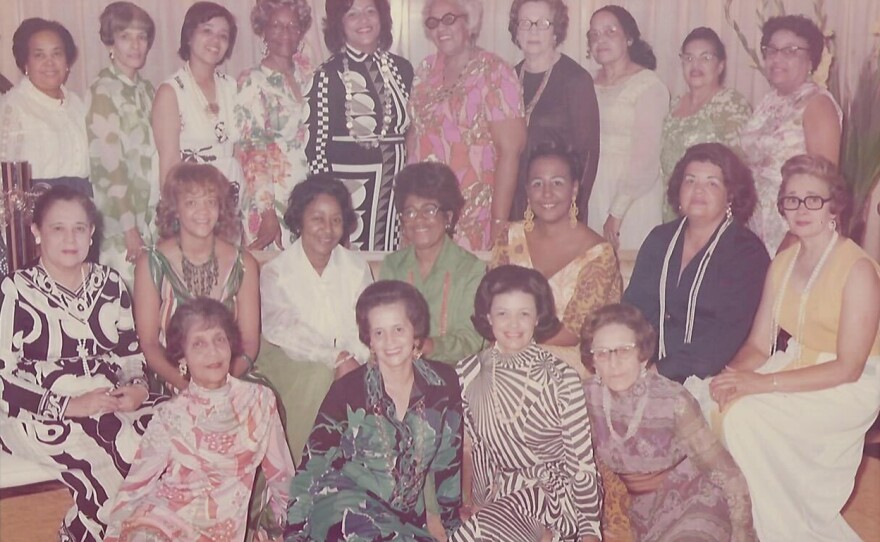The Richmond chapter of The Girl Friends, Inc. fondly remembers Eunice Wilder, a member who recently passed and was a part of the group for 50 years.
Eunice Wilder passed away in January at 83 years old after a brief illness. Wilder served as Richmond City’s treasurer for more than 25 years. She was previously married to former Virginia Gov. L. Douglass Wilder before he was elected the United States’ first African American governor. She was an intricate member of The Girl Friends Richmond chapter, having once served as the president and treasurer.
Jill Bussey Harris, current president of the Richmond chapter, says Wilder brought immense joy to those around her and was a very compassionate person.
“She always kept her humor. I mean, she was hilarious. She’d have you in stitches laughing sometimes,” Bussey Harris said. “She just had a knack about her that was just gracious and inviting, friendly, and just a very loving spirit.”
She fondly recounted a story from last year, when Wilder was unable to make it to the group’s Christmas party but absolutely made sure that two new members received gifts from her. Even though she wasn’t present, Bussey Harris says, Wilder was there in spirit.
“She has richly blessed the Richmond Girl Friends immeasurably over the years by extruding happiness, humor, generosity, charisma and enthusiasm,” Bussey Harris said. “We shall cherish Girl Friend Eunice for all of the little ways she continues to make a big impact.”
Dawn Johnson is an assistant professor of Gender, Sexuality & Women’s Studies at Virginia Commonwealth University. She said that African American women’s social organizations started taking off around the 1890s following the origination of white social clubs, which they were excluded from.
Ida B. Wells, a significant leader in the early civil rights movement, helped to kick off the movement for African American women’s social clubs when she went place to place to get people to organize around preventing lynching in the American South.
These groups pursued social, cultural, educational and philanthropic causes, as well as social justice in a focus to uplift the black community. They provided a safe haven for African American women in a time when discrimination was so prevalent that self-advocating was essential towards progress.
“They've had a great impact on the betterment of Black community, and that's why it's important because they continue to shape the Black community, they continue to hold space for Black women,” Johnson said. “That, in itself, makes them truly critical to our survival. Having a place where we can be amazing Black women is key to overall survival.”
The Girl Friends was founded in 1927 in New York City during the Harlem Renaissance by Eunice Shreeves, who wanted to ensure the bond of friendship she had with her friends would continue while away in college and entering adulthood. Nearly a century later, the group now has 48 chapters across the country dedicated to preserving the friendships that members hold near and dear to their hearts.
All chapters get together once a year for a national conclave in May, where members are able to form friendships across the country, something Bussey Harris describes as a “wonderful feeling”.
She says that Wilder will be acknowledged during this year’s conclave.
The organization’s main purpose now is to not only promote friendship, but to perform civic duties and community service as a means to give back. The group has made significant contributions to the NAACP, the Smithsonian National Museum of African American History and Culture and the Flint water crisis among many others.
The Richmond chapter of The Girl Friends was officially established in May 1938. 84 years later, the chapter is still thriving and promoting love and friendship for its over 40 members, many of whom have been with the group for several decades.
Women in the group can be described as accomplished, civic-minded trailblazers who emphasize community support and charitable contributions. Members have served in both elected and appointed local and state positions, Bussey Harris says. Some of their notable accomplishments include playing an active role in the establishment of the first monument at the Virginia State Capitol honoring African Americans, the Virginia Civil Rights Memorial and the Maggie L. Walker statue, located on the Walker Memorial Plaza.
Bussey Harris says that one of the accomplishments that she’s most proud of is the profound and long-lasting friendships the group has helped foster.
“We have a saying that ‘a Girl Friend is quite a girl’, it's just the bond and the friendship,” Bussey Harris said. “It’s almost magical.”
Johnson said African American sororities are another type of organization focused on uplift and sisterhood, but differ from social clubs in that members are typically younger and have a greater emphasis on community service.
Johnson said that social clubs can play a great role particularly in the lives of older members.
“I think it becomes important, you know, as you get a little bit older in life, and you are looking to really kind of cement these relationships and friendships,” Johnson said.
Blogs created by African American women, like Crunk Feminist Collective and For Harriet, are a more recent type of social group – formed in response to feelings of exclusion from mainstream media, as they had been from white social clubs over a century ago, according to Johnson.
Bussey Harris says the pandemic has been eye-opening for her as to how important it is to get together with your loved ones because things can change so rapidly.
The chapter currently continues to enjoy each other’s company through Zoom meet-ups and socially-distanced gatherings where the legacy of friendship continues with no end in sight.



